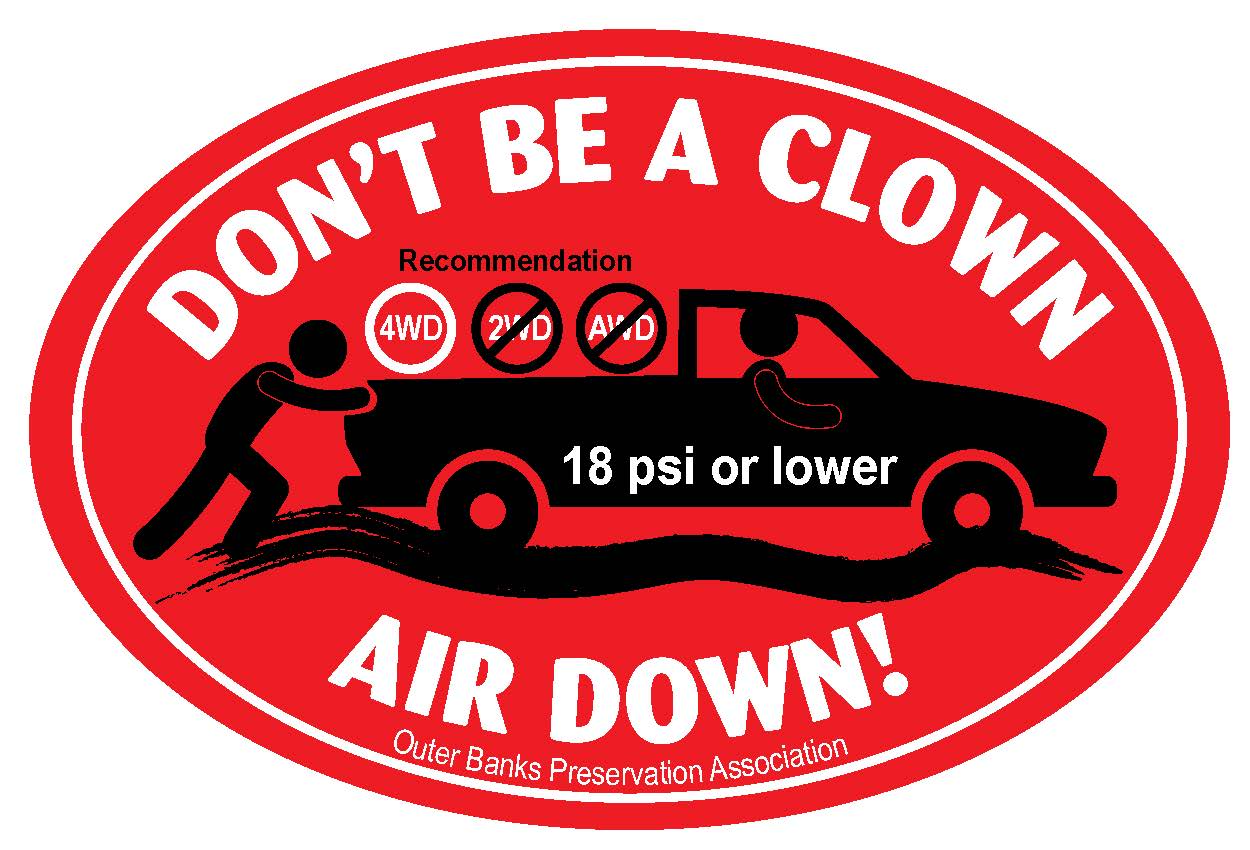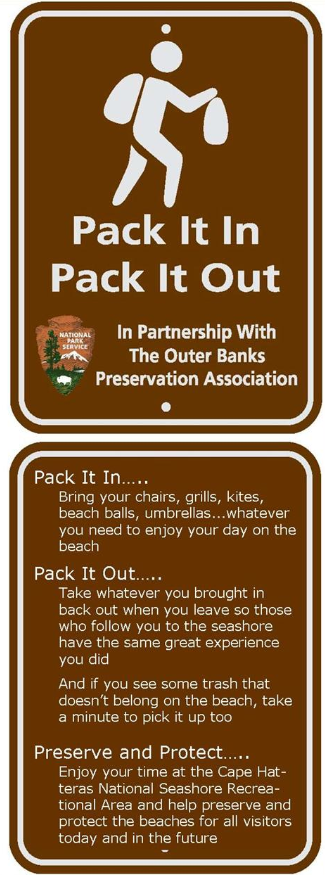National Park Service Beach Access Report for September 16, 2010
FOR IMMEDIATE RELEASE: September 16, 2010
CONTACT: 252-473-2111, ext. 148
Cape Hatteras National Seashore beaches are being managed under the terms of the U.S. District Court approved consent decree. The shorebird breeding season has concluded for the 2010 season. Resource closures remain in place for sea turtle nests that have not hatched yet. When a turtle nest reaches its hatch window 50 to 55 days after being laid, the buffer around the nest is expanded which may preclude through access past the site. Once a nest has hatched and the nest cavity has been examined (excavated by NPS resource management staff to determine emergence rate) the closure will be removed. With a record number of sea turtle nests on seashore beaches this season, park visitors can expect to see frequent changes in access related to these turtle protection areas.
As of September 16, 2010, of the constantly changing, fluctuating estimated 68 miles of ocean shoreline within Cape Hatteras National Seashore, approximately 40.5 miles of ocean shoreline is open to ORV and pedestrian access; approximately 30.4 miles of ocean shoreline is open to pedestrian only access; 0 miles of ocean shoreline is considered “limited access” (areas that are open but may require hiking off-trail to access); and approximately 2.3 miles of ocean shoreline are temporarily closed to all public access due to shorebird and sea turtle resource protection areas. The latest Google Earth beach access map can be viewed at: http://www.nps.gov/caha/planyourvisit/googleearthmap.htm. For more information, check the National Seashore’s website at: http://www.nps.gov.
As of May 1, 2010, all Seashore beaches are closed to off-road vehicles between the hours of 10:00 p.m. to 6:00 a.m. in accordance with the court ordered consent decree. The 10:00 p.m. to 6:00 a.m. prohibition on beach driving will remain in effect until November 15, 2010. Between September 16 and November 15, the National Park Service will issue night driving permits to authorize non-essential driving between the hours of 10:00 p.m. and 6:00 a.m. in areas open to ORV use. A pdf version of the night beach driving permit is available at local tackle shops and visitor centers and on-line and may be downloaded from the national seashore’s website at: http://www/nps.gov/caha/planyourvisit/off-road-vehicle-use.htm.
The Beach Access Report is issued every Thursday throughout the breeding season and will briefly summarize the current status of access in each section of the Seashore listed below. Updated news will be reported weekly in bold, BLUE print.
Note: *All distances are approximate. The mileage is determined on a weekly basis using GIS data and is divided geographically by island this year. Closure conditions may change in the field on short notice. On-site signage, rather than the Beach Access Report or the Google Earth map, is the most accurate and current indication of what is open or closed to the public. Closed areas are clearly marked in the field with “symbolic fencing” consisting of wooden or carsonite posts, closure signs, string, and flagging tape. Knowledge of tidal changes and caution should be exercised while traveling the beaches of the park. Pets are strictly prohibited in resource protection areas. Elsewhere, pets must be physically restrained at all time on a leash not exceeding 6 feet in length. For more information, please contact: This email address is being protected from spambots. You need JavaScript enabled to view it. or call 252-473-2111, ext. 148.
Bodie Island (Ramp 1 to Oregon Inlet; 5.7 miles of shoreline)
Mileage Summary: 4.7 miles open to ORVs and pedestrians; 1.4 miles open to pedestrians only; 0.0 of a mile of limited access; 0.0 of a mile closed to public access due to resource closures.
Ramp 1 - Ramp 2 (Coquina Beach Area) (1.2 miles)
Status: The beach is open for pedestrian access, but not for ORV access.
Ramp 2 - Ramp 4 (2.4 miles)
Status: Ramp 2 is open for ORV and pedestrian access. From Ramp 4 north, the beach is open for ORV and pedestrian access for approximately 2.5 miles.
Ramp 4 – Oregon Inlet (Bodie Island Spit: 2.1 miles)
Status: The 2010/2011 winter closure for Bodie Island Spit has been installed. The beach is open for ORV and pedestrian access 2.0 miles south of Ramp 4 to Oregon Inlet. There is an ORV and pedestrian access corridor to the north side of the Bait Pond. There is 0.2 of a mile of inlet shoreline for pedestrians at the southwestern tip of the Spit. The area is located east of, and close to, the Bonner Bridge.
Hatteras Island (Village of Rodanthe south to Hatteras Inlet; 42.8 miles of shoreline)
Mileage Summary: 25.2 miles open to ORVs and pedestrians; 17.0 miles open to pedestrians only; 0 miles of limited access miles; 0.6 miles closed to public access due to resource closures.
Villages of Rodanthe, Waves, and Salvo - Ramp 23: (Pea Island NWR boundary to Ramp 23 – 5.3 miles)
Status: The annual seasonal village closures lifted on September 16, 2010 but currently, a full beach protection area for a sea turtle protection area precludes ORV access in front of the village. There is pedestrian access.
Ramp 23 - Ramp 27: (4.3 miles)
Status: Ramp 23 is open and there is ORV and pedestrian access north for approximately 0.4 of a mile where a full beach closure for a sea turtle protection area precludes through access in front of the tri-villages of Rodanthe, Waves, and Salvo.
Ramp 27 - Ramp 30: (2.0 miles)
Status: There is through ORV and pedestrian access from Ramp 27 to Ramp 30.
Ramp 30 - Ramp 34: (4.3 miles)
Status: There is through ORV and pedestrian access from Ramp 30 to Ramp 34.
Ramp 34 - Ramp 38: (3.9 miles)
Status: The beach is open for ORV access for approximately 3.2 miles south of Ramp 34. The beach in front of Avon Village is open for ORV and pedestrian access but a full beach closure for a sea turtle protection area, located 0.4 of a mile north of Ramp 38, precludes through ORV access.
Ramp 38 - Ramp 43: (6.0 miles; includes the Haulover soundside & Buxton Village)
Status: The beach is open to ORV and pedestrian access for 0.4 of a mile south of Ramp 38 where a full beach sea turtle protection area precludes ORV through access further south. Pedestrian access is open for approx. 2.0 miles north of the Buxton Village boundary. From Ramp 43 north, the beach is open to ORV and pedestrian access for 0.4 of a mile.
Ramp 43 - Ramp 44: (0.4 of a mile)
Status: The beach is open for 0.2 of a mile south of Ramp 43 where a full beach closure for sea turtle protection area precludes ORV through access to Ramp 44.
Ramp 44 - Ramp 45: (Ramp 44 to tip of Cape Point: 1.0 miles; Cape Point tip to Ramp 45: 1.4 miles)
Status: Ramp 44 is open to ORV and pedestrians access south along the east side of Cape Point for approximately 1.0 mile and then west to Ramp 45 for approximately 1.4 miles. This includes the tip of Cape Point and the “hook” area, the inter-dunal road between Ramp 44 and Ramp 45 and Salt Pond Road.
Ramp 45 - Ramp 49: (South Beach: 3.4 miles)
Status: Ramp 45 is open and there is through ORV and pedestrian access east toward Cape Point. Several full beach closures, the first located approximately 0.1 of a mile west of Ramp 45, for sea turtle protection areas, preclude ORV through access to Ramp 49.
Ramp 49 - Ramp 55: (5.9 miles; includes Frisco and Hatteras Village)
Status: Ramp 49 is open and there is ORV and pedestrian access north for 0.6 of a mile and south of Ramp 49 for approximately 0.6 of a mile where full beach closures for sea turtle protection areas preclude ORV through access. There is pedestrian, but not ORV, access from the northern Frisco village line northeast for 0.4 of a mile and south of the southern Frisco Village line to Ramp 55.
Ramp 55 - Hatteras Inlet: (Hatteras Inlet Spit: 2.6 miles)
Status: ORV and pedestrian access is open along the ocean shoreline from Ramp 55 south/west to Hatteras Inlet and the “Rip.” The Pole Road is open to ORV and pedestrians from Ramp 55 south to the Spur Road. Cable Crossing area is open (with limited parking). The Spur Road is open. The pre-nesting areas at the overwash fans and the inlet have been removed.
Ocracoke Island (19.9 miles of shoreline)
Mileage Summary: 10.6 miles open to ORVs and pedestrians; 8.1 miles open to pedestrians only; 0.0 limited access miles; 1.7 miles closed to public access due to resource closures.
Hatteras Inlet (North Ocracoke Spit) to Ramp 59: (1.3 miles)
Status: Ramp 59 is open to ORV and pedestrian access fir 0.7 of a mile to the inlet.
Ramp 59 - Ramp 67: (7.8 miles)
Status: Ramp 59 is open to ORV and pedestrian access for 0.9 of a mile south of Ramp 59 and 1.0 mile north of Ramp 67.
Ramp 67 - Ramp 70 (includes Ramp 68): (3.8 miles; includes Ramp 68)
Status: The beach is open for ORV and pedestrian access for approximately 1.0 mile north of Ramp 67 and 0.6 of a mile south of Ramp 67. The beach in front of the Ocracoke Campground is open to ORV and pedestrian access. In front of the Ocracoke Day Use area, a sea turtle protection area precludes through ORV access from Ramp 68 to Ramp 70.
Ramp 70 - Ramp 72: (1.8 miles)
Status: The beach is open for ORV and pedestrian access for approximately 0.3 of a mile north of Ramp 70 and 0.6 of a mile south of Ramp 70 where a full beach closure for sea turtle nesting protection area precludes through access.
Ramp 72 to South Point: (2.6 miles)
Status: Ramp 72 is open and there is approximately 0.1 of a mile of ORV and pedestrian access north and 2.0 miles open south of Ramp 72. The 2010/2011 winter closure for South Point has been installed. The beach is open to ORV and pedestrian access on the ocean shoreline for approximately 2.5 miles south of Ramp 72. There is pedestrian access for an additional 0.5 of a mile. There is fall and winter soundside access for ORV and pedestrian via a South Point spur road just south of the dune line.
Temporary resource protection areas are necessary to protect threatened and endangered species and species of concern including piping plovers, American oystercatchers, colonial waterbirds (3 species of terns and black skimmers), and sea turtles. Posted areas are closed to vehicles, pedestrians, and pets.
-NPS-


